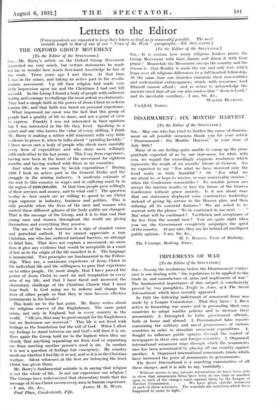Letters to the Editor
[Correspondents are requested to keep their letters as brief as is reasonably possible. The most suitable length is that of one of our "News of the Week" paragraphs.—Ed. SPEcraTon.1 THE OXFORD GROUP MOVEMENT [To the Editor of the SPECTATOR.] Sin,—Mr. Barry's article on the Oxford Group Movement interested me very much, but certain statements he made led me to wonder how much first-hand knowledge he has of the work. Three years ago I met them. At that time I was in the mines, and taking an active part in the revolu- tionary movement. tip till then religion had made very little impression upon me and the Christians I had met left me cold. In the Group I found a body of people with sufficient daring and courage to challenge the most ardent revolutionary. They had a simple faith in the power of Jesus Christ to redeem human life, and that faith was based on personal experience.
What impressed me most was the fact that this group of people had a quality of life to share, and not a point of view to express. Frankly I was not interested in their opinions but I was interested in the life they lived. Speaking as a miner and one who knows the value of every shilling, I think Mr. Barry is making a rather wild statement with very little evidence to prove it, when he talks about" spending lavishly." I have never met a body of people who check more carefully every item of expenditure and who share more willingly with each other to the last penny. This I say from experience, having now been at the heart of the movement for eighteen months and having worked with them in six countries.
Just what do we mean by lavish expenditure ? During 1926 I took an active part in the General Strike and the struggle in the mining industry. A moderate estimate of the cost to this country in wages and in suffering must be in the region of 1200,000,000. At that time people gave willingly of their services and money, and to what end ? The question to-day is—how much are we willing to spend to see Christ reign supreme in industry, business and politics. This is only possible when the lives of the men and women who control these different spheres of the body politic are changed. That is the message of the Group, and it is to that end that young men and women throughout the world are giving themselves and everything they possess.
The use of the word American is a sign of clouded vision and parochial outlook. If we cannot appreciate a true Christian, one who has outlived national barriers, we attempt to label him. That does not explain a movement, no more does it give any, evidence that would be acceptable in a court of law as to the origin of the life manifest in it. The language is immaterial. Two principles are fundamental in the Fellow- ship. They are, a maximum .experience of Jesus Christ in the individual life and the willingness to pass that experience on to other people. Or, more simply, that I have proved the power of Jesus Christ to meet sin and temptation in every area of my life, and that I have faced and answered the elementary challenge of the Christian Church that I must bear fruit. Is God using me to redeem and change the lives of other people so that they in turn become effective instruments in his hands?
This leads me to the last point. Mr. Barry writes about the religious reserve of the Englishman. The same point arises, not only in England, but in every country in the world. "Oh yes, that may be good enough for the Englishmen but we Scotsmen are reserved." This life is not lived with feelings as the foundation but the will of God. When I allow my feelings to stand between me and God's will then it is sin. Here again the Group hold me to the highest when they say clearly that anything separating me from God or -separating me from meeting another person's need is sin. In warfare it is not a question of feelings but emergency. My country needs me whether I feel like it or not, and so it is in the Christian warfare. Silent witnesses at the best are betraying the trust Christ has given them.
Mr. Barry's fundamental mistake is in saying that religion is not the whole of life. Is not our experience our religion ? The Groups have rediscovered that elementary truth that the message of Jesus Christ covers every area in human experience.
—I am, Sir, &e., JAMES H. N. WATT. Paul Place,. Cowdenbeath, Fife.


























 Previous page
Previous page